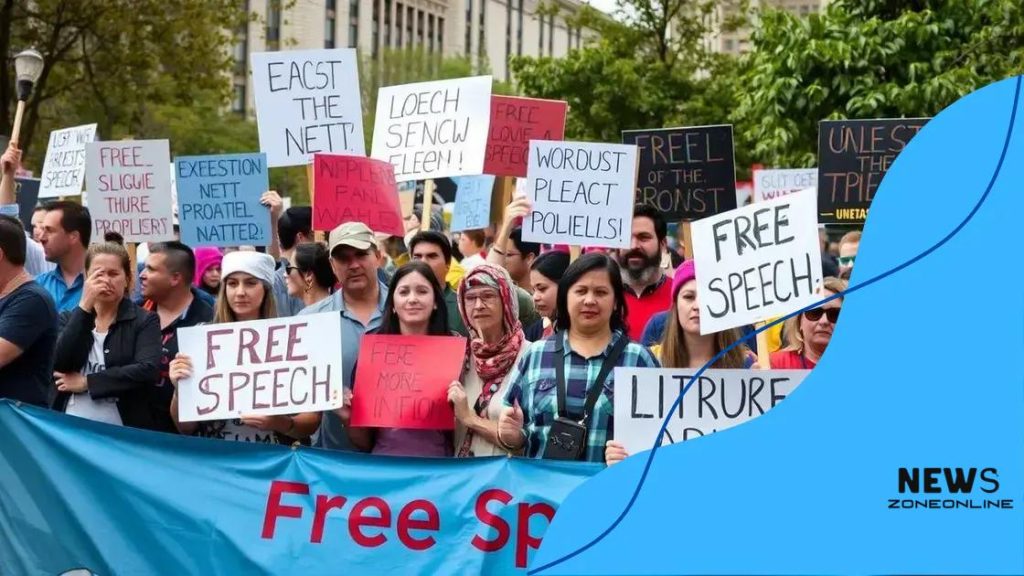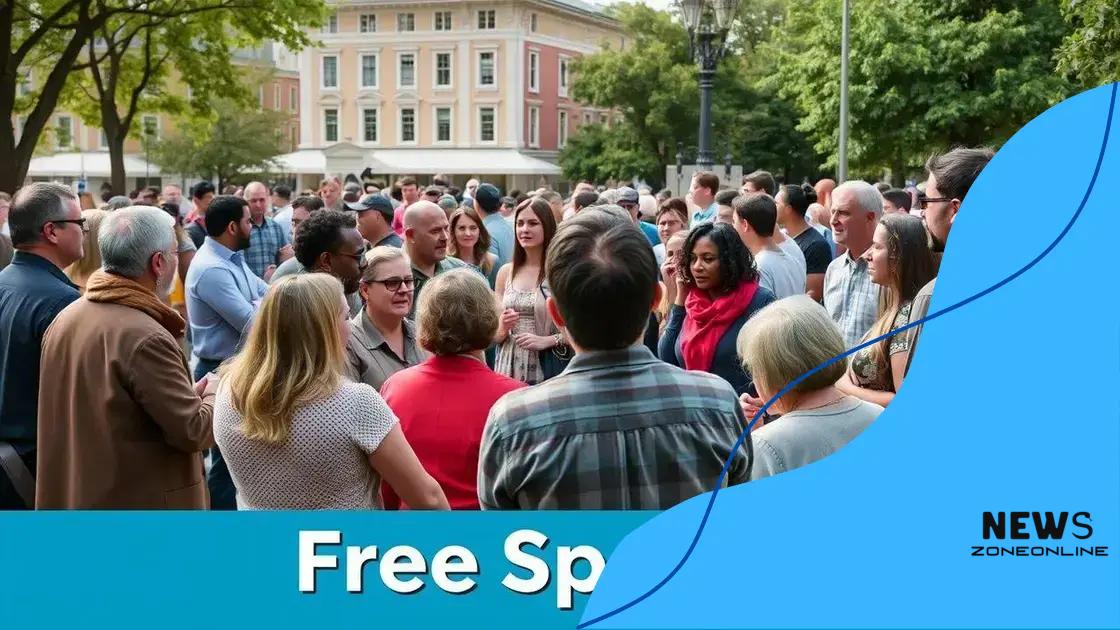Political slogan censorship backlash: what’s at stake?

Political slogan censorship limits free expression and affects public discourse, often leading to backlash and increased demand for diverse voices in society.
The rise of political slogan censorship backlash has sparked intense debates about free speech in our society. Have you ever wondered how limiting slogans shapes our democratic discourse?
Understanding political slogan censorship
Understanding political slogan censorship is essential in today’s society. It’s a topic that raises questions about freedom of expression and the role of language in politics. In this section, we’ll explore the concept and its impacts.
What is Political Slogan Censorship?
Political slogan censorship refers to the practice of limiting or prohibiting certain slogans or phrases used in political contexts. This can happen through government regulations, social media policies, or public backlash. The goal is often to maintain order or promote specific values.
Reasons Behind Censorship
There are various reasons for the censorship of political slogans, including:
- To prevent hate speech and misinformation.
- To uphold national security and social stability.
- To promote public safety during protests or movements.
However, this censorship can also have negative connotations, as it may suppress legitimate expressions and discussions. The challenge lies in finding the balance between protecting individuals from harmful content while allowing room for free speech.
As communities and social media evolve, so do the methods of censorship. More often than not, slogans that challenge the status quo may face restrictions. This can lead to significant debate on the fairness of such actions.
Consequences of Political Slogan Censorship
Censorship can have profound effects on public discourse. When people feel their slogans are silenced, they might be discouraged from voicing their opinions. This can create an environment where only safe ideas are expressed, leading to a lack of diversity in viewpoints.
Furthermore, the backlash against censorship often leads to increased support for those attacked. People may rally around the censored slogan, viewing it as a symbol of resistance and a testament to the importance of freedom of expression. In this way, censorship can sometimes backfire, igniting more passion and discussion around the issue.
Ultimately, understanding the dynamics of political slogan censorship requires a nuanced approach. As the dialogue around political expression continues to evolve, it’s crucial for individuals to engage in these discussions actively. By advocating for open dialogue, we can support the essential pillars of democracy.
Historical context of censorship and backlash
The historical context of censorship and backlash is rich and complex. Throughout history, societies have struggled with finding the right balance between security and free expression. Different eras and cultures have shaped how censorship is applied.
Early Forms of Censorship
In ancient civilizations, censorship often came from rulers who sought to maintain control. Information was a powerful tool, and limiting access to it helped suppress dissent. Ancient Rome, for example, employed censorship to silence political rivals.
Modern Developments
As society evolved, so did the means of censorship. In the 20th century, both world wars saw governments tightly controlling information. Propaganda became a common tool, showcasing how leaders used censorship to sway public opinion and secure support for war efforts.
- World War I introduced significant restrictions on press freedom.
- During World War II, numerous countries enacted severe censorship laws.
- The rise of totalitarian regimes, such as Nazi Germany, highlighted the extreme measures taken to control narratives.
However, such censorship often led to backlash. For instance, societies that experienced heavy censorship frequently saw movements rise against it. Literature and art became powerful means of resistance, helping to articulate the frustrations of the populace.
In the latter half of the 20th century, the advent of the internet transformed the landscape of censorship. Information became more accessible, leading to greater scrutiny of governmental actions. Social media platforms emerged as spaces where individuals could express dissenting views freely. But this also brought new challenges, as governments began to develop strategies to regulate online speech.
Understanding the historical context of censorship allows us to appreciate the progression of free speech. Each backlash against censorship has played a role in shaping laws and societal norms today. It reminds us that the fight for expression is ongoing and vital to democratic societies.
Impacts on free speech and public discourse

The impacts on free speech and public discourse due to censorship are profound and complex. When certain political slogans or messages are silenced, it affects how individuals engage with ideas and express their beliefs.
Effects on Public Engagement
Censorship can create an environment where people hesitate to share their thoughts openly. This hesitation stems from the fear of retribution or being labeled as controversial. As a result, vital discussions may either be muted or entirely avoided. The absence of diverse opinions can stunt the growth of public discourse.
The Role of Media
Media plays a significant role in shaping public opinion. When censorship is prevalent, media outlets may avoid exploring certain topics. This avoidance limits what information is available to the public and shapes a narrow view of reality. Consequently, crucial issues may not receive the attention they deserve.
- Censored media diminishes public knowledge.
- Trust in media sources can decline.
- Alternative channels may arise, leading to misinformation.
On the other hand, censorship often triggers a backlash, motivating people to seek alternative forms of communication. This leads to the rise of underground movements and social media platforms where users foster open dialogue and express dissenting opinions. In many cases, when individuals band together, they can challenge oppressive censorship.
Furthermore, the impacts of censorship on public discourse can lead to new expressions of creativity. Artists, writers, and speakers may find innovative ways to convey their ideas despite restrictions. They employ metaphor, satire, and other techniques to bypass censorship while still delivering their messages.
Ultimately, understanding how censorship influences free speech and public discourse is crucial. As society navigates these challenges, the interaction between censorship and the public’s reaction will continue to define the landscape of democratic expression.
Case studies of censorship incidents
Case studies of censorship incidents provide valuable insights into the complex nature of political slogan censorship. These real-world examples illustrate how censorship unfolds and the varied reactions that follow.
The Tiananmen Square Protests
The 1989 Tiananmen Square protests in China are one of the most significant examples of censorship in modern history. The Chinese government suppressed all information about the protests, including the iconic image of the “Tank Man,” who stood up to a line of tanks. Even today, discussing these events is met with strict censorship. This incident highlights the extreme measures governments can take to control political narratives.
France’s Charlie Hebdo Incident
In 2015, the attack on the Charlie Hebdo office sparked global discussions about censorship and free speech. The magazine had published cartoons that offended various religious groups, leading to violent retaliation. This incident prompted conversations about the limits of free expression and the impact of censorship on artistic and journalistic endeavors. Following the attack, many rallied around the slogan “Je Suis Charlie” to show solidarity with free speech.
- Increased support for freedom of speech worldwide.
- Debate over drawing the line between free speech and hate speech.
- Public demonstrations in multiple cities advocating for free expression.
Another significant incident occurred during the Arab Spring. Activists in countries like Tunisia and Egypt used social media to organize protests and share critical information. However, governments responded with severe censorship measures, attempting to shut down communications to quell dissent. Despite these efforts, movements gained momentum, ultimately leading to political change in several nations.
These case studies reveal the ongoing struggle between censorship and the desire for free expression. Each incident underscores the importance of vigilance in protecting free speech and highlights the consequences when censorship is enforced. As societies continue to navigate these complex issues, learning from past incidents can guide future discussions about the balance between security and expression.
Navigating the complexities of freedom of expression
Navigating the complexities of freedom of expression requires understanding the delicate balance between individual rights and societal norms. This topic is crucial in discussions about censorship and public discourse. When it comes to expressing opinions, various factors come into play.
The Importance of Context
Context plays a vital role in how expressions are received. Different cultures and communities have varying thresholds for what is acceptable speech. In some cases, what appears to be a harmless expression in one culture may be deeply offensive in another.
Challenges to Freedom of Expression
Despite its importance, freedom of expression faces numerous challenges today. For instance, increasing polarization in society can lead to echo chambers where dissenting opinions are silenced. The rise of social media also contributes to this issue. Content moderation practices may inadvertently censor legitimate expressions.
- Algorithms controlling content can bias opinions.
- Hate speech laws may suppress genuine discussion.
- Public shaming can discourage open dialogue.
Moreover, individuals often face pushback when expressing unpopular or controversial views. This can manifest as social ostracism or even professional consequences. In these situations, the fear of repercussions can stifle open communication.
However, amidst these complexities, advocacy for freedom of expression remains vital. Activists highlight the importance of protecting dissenting voices and ensuring that all members of society can engage in discussions without fear. Building platforms for constructive conversations can help bridge divides.
Ultimately, navigating these complexities requires ongoing dialogue and a commitment to understanding diverse perspectives. By embracing the principle of freedom of expression, communities can foster healthier, more inclusive discussions.
FAQ – Frequently Asked Questions about Political Slogan Censorship and Freedom of Expression
What is political slogan censorship?
Political slogan censorship is the practice of restricting or prohibiting certain slogans or phrases used in political contexts to control public discourse.
How does censorship impact free speech?
Censorship limits diverse opinions and can create an environment where individuals are hesitant to express their thoughts openly, stifling healthy discussions.
What are some historical examples of censorship?
Notable examples include the Tiananmen Square protests, where the Chinese government suppressed information, and the Charlie Hebdo incident, which sparked debates about the limits of free expression.
Why is it important to advocate for freedom of expression?
Advocating for freedom of expression is vital to ensure diverse voices are heard, fostering healthy dialogue and promoting a more inclusive society.





